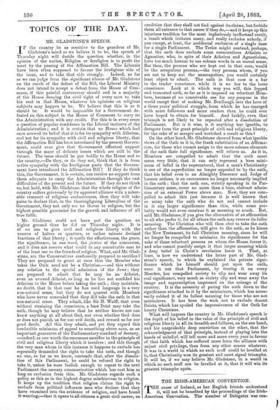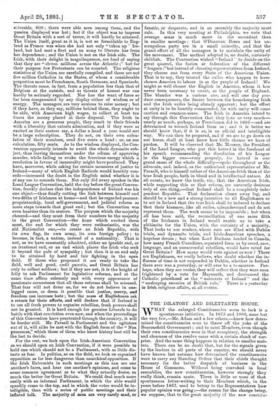THE IRISH-AMERICAN CONVENTION.
MHE cause of Ireland, as her English friends understand it, will not be benefited by the proceedings of the Irish- American Convention. The number of Delegates was con-
siderable, 800; there were able men among them, and the passion displayed was hot ; but if the object was to impress Great Britain with a sort of terror, it will hardly be attained. The Union itself, great as it is, is not so formidable to Eng- land as France was when she had not only "taken up" Ire- land, but had sent a fleet and an army to liberate her from her dependence ; and the Union is not on the Irish side. The Irish, with their delight in magniloquence, are fond of saying that they are "eleven millions across the Atlantic ;" but for their purpose few Protestants can be counted. The religious statistics of the Union are carefully compiled, and there are not five million Catholics in the States, of whom a considerable proportion must be Frenchmen, South Germans, and Spaniards. The threats come, in fact, from a population less than that of Belgium at the outside, and as threats of honest war can hardly be seriously regarded. Nor has the want of force so far been compensated by any display either of wisdom or of energy. The managers are very anxious to raise money ; but if they have, as they say, millions behind them, they ought to be able, with American high wages, to collect at least ten times the money placed at their disposal. The Irish in America are a generous people, they remit to their friends -with a liberality that extorts admiration, and if they were as excited as their orators say, a dollar a head a year would not be a large subscription. They do not, on their own calcu- lation of their numbers, send five cents a head ; or, on our calculation, fifty cents. As to the wisdom displayed, the Con- vention apparently intends to avoid the whole dynamite sub- ject, thus leaving themselves under the odium of approving murder, while failing to evoke the ferocious energy which a resolution in favour of immorality might have produced. They have, moreover, while asking for certain measures of justice to Ireland—many of which English Radicals would heartily con- cede—increased the doubt in the English mind whether it is of any use to concede them. Not only did every speaker in the Land League Convention, held the day before the great Conven- tion, frankly declare that the independence of Ireland was his one object—thus finally cutting the link between himself and two-fifths of Irishmen at home—and that he regarded peasant- proprietorship, local self-government, and judicial reform as mere steps towards that great end ; but the Convention was even heartier than its orators. The purpose which the majority cheered—and they must from their numbers be the majority in the great Convention—the hope which excited them most, the end for which they were enthusiastic, was the old Nationalist one,—to create an Irish Republic, with its own flag, its own army, its own foreign policy ; to become, in fact, a nation, instead of a nationality. That is not, as we have constantly admitted, either an ignoble end, or an irrational end, or an end which places the Irish who seek it beyond the pale of sympathy ; but then it is an end only to be attained by hard and fair fighting in the open field. If those who propound it are ready to take the field, well and good, cadit qucestio, and Great Britain has only to collect soldiers ; but if they are not, it is the height of
folly to ask Parliament for legislative reforms, and at the same time affirm solemnly and with every appearance of passionate earnestness that all those reforms shall be misused. That fear will not deter us, for we do not believe in one-
legged races, or deem it possible that justice, mercy, and
freedom can increase hate ; but the mass of Englishmen ask a return for their efforts, and will declare that if Ireland is
to use all fresh powers to organise rebellion, fresh powers shall
not be granted. It is hard enough for genuine Liberals to do battle with that conviction even now, and when the proceedings of this Convention have penetrated through the country, it will be harder still. Mr. Parnell in Parliament and the agitators out of it, will alike be met with the English form of the "Non possumus," which those of them who know history best will be the last to deride.
For the rest, we look upon the Irish-American Convention as we should upon an Irish Convention, if it were possible to hold one which should not be a Parliament, with as little dis- taste as fear. In politics, as on the field, we look on organised opposition as far less dangerous than anarchical opposition. If the Irish Extremists in such meetings as this can see one another's faces, and hear one another's opinions, and come to some common agreement as to what they actually desire, so much the better for Great Britain. We could deal much more easily with an informal Parliament, in which the able would speedily come to the top, and in which the votes would be in-
telligible, than with a series of public meetings and their inflated talk. The majority of men are very rarely mad, or
fanatic, or desperate, and in an assembly the majority must rule. In this very meeting at Philadelphia, we note that average sense is much more in the ascendant than
in smaller meetings ; that O'Donovan Rossa and his un- scrupulous party are in a small minority, and that the grand effort of all the managers is to maintain the unity of the movement. The method adopted is, no doubt, curiously childish. The Convention wished " Ireland " to decide on the great quarrel, the fusion or federation of the different "leagues ;" but instead of choosing representatives from Ireland, they choose one from every State of the American Union. That is to say, they treated the exiles who happen to have chosen America to labour in as the people of Ireland ! We might as well choose the English in America, whom it has never been necessary to count, as the people of England. The blunder was a curious one, and will one day pro- duce consequences, the fissure between the homekeeping Irish and the Irish exiles being already apparent ; but the effort at unity is to be heartily commended, for with unity will come caution and common-sense. The Irish in America intend to say through this Convention that they hate us very much— nearly as much, perhaps, as Frenchmen did in 1816—and are determined to wrench Ireland from us ; and. it is better we should know that, if it is so, in an official and intelligible way. We can then be prepared, and if we are to go down cn our knees, shall at least know how little chance we have of pardon. It will be observed that Mr. Mooney, the President of the Land League, who put this hatred in the forefront of his speech recommending the dissolution of his League in the bigger one—very properly, for hatred is one grand cause of the whole difficulty—spoke throughout as the advocate, and, indeed, as the authorised representative of Mr. Parnell, who is himself rather of the American-Irish than of the true Irish people, both in blood and in intellectual nature. At all events, we know the truth, viz., that the American Irish, while supporting this or that reform, are earnestly desirous only of one thing,—that Ireland shall be a completely inde- pendent Republic. That declaration clears away fog, and should be a new and a strong incentive to all Englishmen so to act in Ireland that the true Iri.th shall be induced to declare that their kinsmen, like all exiles, misunderstand and do not represent them. The work seems to b3 impossible ; but when all has been said, the reconciliation of one more fifth of the Irishmen in Ireland would enable us to take a plebiscite for the Union, with the certainty of a majority. That looks to our readers, whose ears are filled with Dublin trials, and dynamite trials, and Irish-American speeches, a hopeless dream ; but when Lard Durham landed in Canada, how many French Canadians, separated from us by creed, race, language, and an unsuccessful rebellion, would have voted for Great Britain? How many would vote against us flow? There are Englishmen, we verily believe, who doubt whether the in- fluence of time is not suspended in Dublin, whether in Ireland there ever was a yesterday, or will ever be a to-morrow. Per- haps, when they are cooler, they will reflect that they were once frightened by a vote for Maynooth, and denounced the Catholic priesthood as the autocrats of Ireland" and the "unsleeping enemies of British rule." There is a yesterday in Irish religious affairs, at all events.



































 Previous page
Previous page